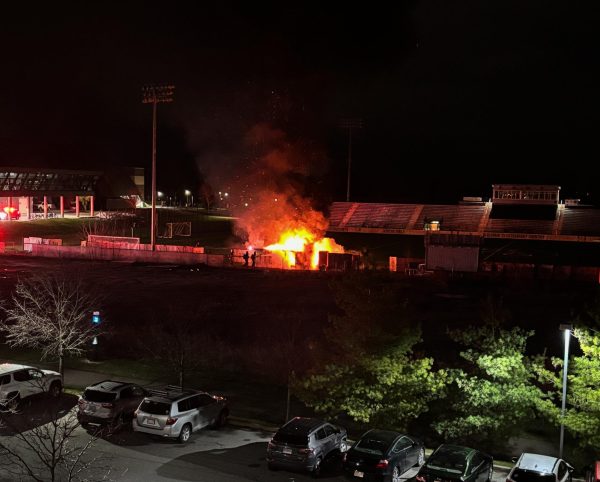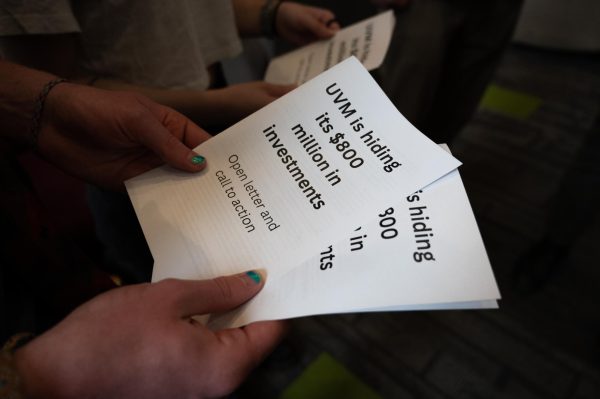RAs, ResLife at odds over job duties
Photo Illustration: An RA at the front desk of Living/Learning March 9. Residential Life announced additional responsibilities for RAs beginning fall 2023, which has led to some pushback by students in the role.
Some residential advisors at UVM are concerned about an increase in responsibilities this academic year without prior notice, three RAs said, though ResLife Director Charles Holmes-Hope says changes were made with the input of RAs.
One RA in their first year in the role, who—due to fear of retaliation—wished to remain anonymous, said their concerns began when Holmes-Hope called for the additional responsibility of weekend daytime duty to be taken on by RAs beginning in fall 2022. This is not explicitly outlined in the 2022-23 handbook, they said.
Holmes-Hope stated in a March 23 email that there will be no additional changes implemented in the 2023-24 academic year and acknowledged new responsibilities added this year, saying they were made with input from an undisclosed number of RAs.
“It needs to be shared that intentional focus and student agency regarding the implementation of our weekend duty structure were explored with our RAs by engaging them in the process so that they feel a part of the discussion,” he stated.
However, the anonymous first-year RA felt the department’s changes do not reflect the feelings of the majority of RAs.
“They added on some stuff basically explaining that we had to do weekend [daytime] duty,” the first-year RA said. “Which isn’t too bad, but it demonstrates [ResLife’s] ability to just add extra things that no one really signed up for.”
Weekend daytime duty entails being on call at all times during one’s shift to assist any residents that might need help, which is different from previous years where RAs were only expected to be on call at night or in the evenings, the first-year RA said.
The 2022-23 RA handbook states that weekend daytime duty is “rotated amongst multiple staff groups per campus.”
According to the first-year RA, “staff groups” did not previously include RAs, and instead referred to other ResLife staff members.
A third-year RA, who also wished to remain anonymous, said RAs are now expected to meet with residents after terms and conditions violations in addition to being on call during the day on weekends. The handbook states that second violations result in “a conversation with the Residential Life Staff.”
“This year, the big thing has been jobs [such as weekend daytime duty] that were traditionally an assistant resident director or resident director’s responsibility have trickled down to RAs due to short staffing,” the RA said.
The first-year RA speculates that part of ResLife’s motive for this is to remove funding from paid positions and allocate those tasks to unpaid staff such as RAs, they said.
RAs receive free housing and a meal plan as compensation, according to ResLife’s website. This means they are not paid as traditional staff members.
A second-year RA, who also spoke under the condition of anonymity, believes that with an increased influx of incoming first-years, ResLife doesn’t have enough staff to manage all residents, they said.
“In order to manage more residents, they want us to be on duty more often,” they said.
ResLife incorporated RA voices in the decision-making process by having staff brainstorm solutions related to performing weekend duty and by meeting with RAs, Holmes-Hope stated.
“Since arriving at UVM in June of 2022, many of the changes and ideas that we are discussing/putting in place are aligned with national standards in our profession to support the residential experience,” he stated.
The third-year RA said that because there was a change in leadership this year—as it is Holmes-Hope’s first year as director of ResLife—changes in expectations are inevitable.
However, when ResLife announced the upcoming change at an event last semester, RAs began voicing their concerns, the first-year RA said.
“[The opposed RAs] were rightfully concerned that this wasn’t in our contract,” they said. “They were kind of abusing their duties.”
The third-year RA said this additional expectation could limit the student life of RAs.
“For some people, additional duties are preventing them from holding a job, participating in clubs and other extracurricular involvement,” they said.
The first-year RA said that many other RAs agree, and there was continuous push-back from other RAs following ResLife’s announcement in August 2022.
“It was mainly returning RAs who were leading this pushback and saying, ‘this isn’t right,’” they said.
Soon after the discourse began, rumors of changes to next year’s rehiring process started circulating amongst RAs, the first-year RA said.
“[The rehiring process] kind of changed this year for no reason,” they said. “It’s kind of unclear why it was implemented, but it was just brought about when we started to push back against changes.”
Both the first- and second-year RAs speculate that this is a purposeful precedent set in place in order to stop returning hires from coming together as a group to retaliate against what they believe to be unfair expectations, they said.
“Having a staff with all fresh, new people makes it difficult for anyone to really come together and speak out against things happening,” the first-year RA said.
The second-year RA, who was rehired once before and is trying to be rehired again, agreed that this year’s rehiring process is different compared to previous years, they said.
“ResLife might not want to have rehires because they know that we know [the policies] well,” the second-year RA said. “And so when something changes, that’s a big red flag to us and we’re gonna speak up about it.”
Holmes-Hope stated that current RAs must reapply as part of a standard hiring practice that is common throughout the country.
“The Department of Residential Life reserves the right to determine hiring needs for the upcoming academic year toward supporting and building on the residential experience,” he stated.
It is unclear whether there will be a significant difference, but if there is a noticeable lack of returning RAs next year, there could be inadequate mentorship in the future, the first-year RA said.
The second-year RA said that many RAs agree this decision could also pose problems in the mentoring process for new RAs. The first-year and second-year RAs believe rehires are the most important factor in new hires learning how to do their job.
“It’s important that rehires are always there to support their fellow staff,” the second-year RA said. “The way we know how to function in our jobs is because returning RAs teach us.”
The second-year RA also said that other RAs agree that the training they receive is only semi-adequate and that they primarily rely on more experienced peers for guidance.
The first-year RA agreed that the training provided by ResLife wasn’t as helpful.
“The training we receive really doesn’t do that much,” the first-year RA said.
Holmes-Hope did not address this claim when the Cynic inquired for comment in a follow-up email.
Through its attempt to avoid collective pushback fro RAs, ResLife could be dealing with a large number of undertrained RAs in the future, the RAs interviewed said.
According to the three RAs, it is unclear what the outcome will be next semester. However, the rehiring process may be tougher and more selective, and because of this, future RAs could suffer, two of the RAs said.














